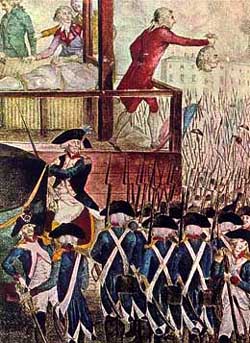| Editor's Note: The following is an abstract of a paper presented at a seminar held by Christ the King Law Center (CKLC) on October 5, 2013 titled Is the Constitution Catholic? |
In ideological terms a liberal is generally someone who accepts the principles of the French revolution. Liberals accept the revolutions ideals of Liberty, Equality, and Fraternity and the results that flowed from these principles such as the separation of Church and State and the equal treatment of all religions under the law.
Liberalism has been repeatedly condemned by the Church. When the French Revolution broke out the leaders of the Revolution laid down the principles of liberalism in the famous Declaration of the Rights of Man. This document was formally condemned by Pope Pius VI (1775-1799). [3] Pope Gregory XVI (1831-1846) explicitly condemned Liberalism in his Encyclical Mirari Vos. [4] And Blessed Pope Pius IX (1846-1878) repeatedly condemned liberalism in his allocutions, briefs, and encyclicals and in his Syllabus of Errors. [5] Pope Leo XIII (1878-1903) stated that ‘many there are who follow in the footsteps of Lucifer, and adopt as their own his rebellious cry “I will not serve,” and consequently substitute for true liberty what is sheer and most foolish license. Such, for instance, are the men belonging to that widely spread and powerful organization, who, usurping the name of liberty, style themselves liberals.’ [6]
[1] T. Bokenkotter. A Concise History of the Catholic Church 368 (2005).
[2] Ibid.
[3] F. Sarda Y Salvany. Liberalism is a Sin 52-63 (1886).
[4] Ibid.
[5] Ibid.
[6] Leo XIII, Encyclical Immortale Dei (1885) 14.

 RSS Feed
RSS Feed
